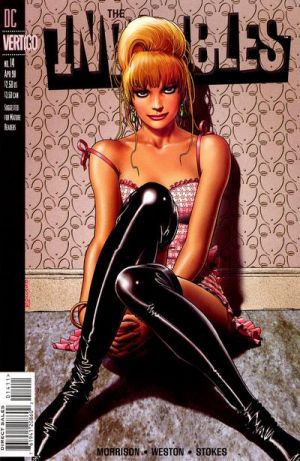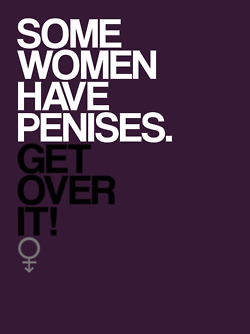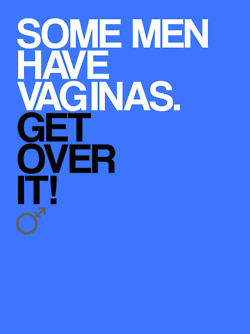Comics /
Comic Reviews /
More Comics
Trans Identity in Fiction: Life Before Transition
By J. Skyler
January 6, 2013 - 17:03
 |
| Cover to The Invisibles #14 (1997) by Grant Morrison and Brian Bolland featuring Lord Fanny, a Male-to-Female (MtF) trans woman, shaman and sex worker |
Last week,
Religion & Politics did an expose on Cameron Partridge, who "now has the distinction of being one of the first trans chaplains at a
major university, in addition to being one of just seven openly trans
clergy in the Episcopal Church." LGBT-inclusion in Christianity is always a subject worth discussing, especially when progress such as Partridge's appointment is what will hopefully prove to be an ever-growing trend. However, for most transgender individuals, discussing their lives prior to their transition can be a touchy subject after the fact. There is an irrefutable right to privacy and probing questions, even ones phrased respectfully, can be seen as intrusive. As Partridge states, "[s]ometimes portrayals of trans lives have a before-after type focus... They can dwell on people’s former lives, their previous names, when they ‘knew’ they were trans, how their family reacted. And while that can be powerful, I personally find that narrative pattern restrictive and sometimes invasive.” While I have no intention of invalidating the chaplain's personal experience, my own has been quite different. The vast majority of media portrayals I've come across have featured characters who are in transition or who are reaffirming their lives after. I find this troubling because so many people have questioned the validity of
my gender identity because I have
not transitioned. The lack of interest in developing meaning works involving trans individuals can leave those in differing stages of transition feeling marginalized by what is currently available. As someone who is considered non-operative, I feel compelled to speak about life before transition, in addition to supporting and advocating for those who are going through or who have completed gender reassignment.
How do we begin discussing the proper portrayal of trans identities? It is vital to first understand terminology and their implications. While sex and gender were once considered to be synonyms, clinical as well as social-political developments over the past century have revealed they are differing points on the spectrum of the human condition. “Transgender” is an sociological umbrella term which indicates an individual's genetic or anatomical sex is opposite their self-perceived sense of being male or female. The word “transsexual” is slightly more specific in the medical/clinical sense, indicating someone who has yet to complete sex reassignment surgery (SRS), is in the process of transitioning, or who has already completed their transition (designated as per-operative and post-operative, respectively). Transgender/transsexual is opposite of being cisgender/cissexual, words which indicate one's gender identity matches their anatomical sex. To be cisgender is perceived as normative and the natural extension of that mentality is for people to fulfill certain gender role expectations based on their birth sex. It is not at all uncommon for cisgender individuals to have difficulty fulfilling gender role expectations, even though their gender identity is in sync with their anatomical sex. Thus, it goes without saying that for children who become self-aware of their transgender identity at an early age (and who completely disassociate with their physical anatomy), the psychological pressure to conform to the expectations set forth by their families, peers and social imagery and/or commentary in the media can be a terrible burden.
 |
Public discourse, as well as legal, psychiatric and medical commentary on transgender and transsexual related issues almost always focus on the transitioning process. Though a great deal of advocacy is (rightfully) dedicated to providing accurate information, counseling and legal protections to those in transition or who have completed hormone therapy and genital reconstruction, little commentary addresses those who are either pre-operative or have chosen not to transition at all. The consequence is that the general public often assumes that in order to be considered “transgender,” one must either be in transition or have already completed gender reassignment. Deirdre Golash raises the question in
Freedom of Expression in a Diverse World (2010) “how can one declare oneself a 'non-operative transsexual' in a cultural setting in which transsexuality is still almost exclusively understood as a medically pathologized condition based on binary gender ideology? ...we can probably start talking seriously about what it means to be a 'non-operative transsexual', or what it means to be transgendered, only after we shed the binary gender ideology.” The reality is that transgender individuals challenge preconceived notions of gender role and conformity, well before transitioning ever becomes a viable option.
Conformity to gender role is indoctrinated essential from birth. I mentioned previously in “
I am Not My Penis: A Response to the Roseanne Barr Controversy” that there is a probable neurological causality in psychological gender (for transgender and cisgender people alike), but societal gender roles are largely cultural in context. After all, men doing manual labor and women handling household chores have absolutely nothing to do with biology. Nonetheless, names, toys, color schemes for nurseries and clothing (in addition to clothing itself) and a great deal of social interaction focus exclusively hyper-masculine or hyper-feminine imagery. Even in utero, our lives have a tendency to be mapped out based entirely on our anatomical sex. How many parents have said “I hope
he becomes an athlete” or “I hope
she takes up ballet” after confirming a pregnancy? The implications of those statements is that little girls do not grow up to become professional athletes and little boys do not grow up to become ballet dancers, even though men and women are quite common in both fields. Granted, there is absolutely nothing wrong with a boy wanting to play sports or a girl wanting to take dance lessons, but such things should be a matter of self-determination, not social obligation. Sadly, parents and peers alike often reward gender-conformity and punish non-conformity, either consciously or subconsciously. We are told habitually what it means to be a “man” and what it means to be a “woman” in life and failing to live up to those expectations can lead to alienation—in familial relationships, friendships and romance—in addition to depression, self-loathing, suicidal or even homicidal tendencies. Trans individuals must endure a great deal to express their perceived gender and it is a daily, life-long struggle.
 |
In
Biology of Human Reproduction (2002), author Ramón Piñón describes
the disconnect trans individuals experience between their psychological
gender and physical anatomy as “the source of psychic pain,” which is
the most eloquent way of putting it that I've ever come across. I can't count the number of times I've scraped my face with a razor to
the point of bleeding just to make sure every single follicle of hair is
removed. Intellectually, I know there only so many times I can run a
blade across the same area of skin before it breaks, but emotionally,
the compulsion to rid myself of that particular physical characteristic
just so people can't focus on my facial hair when they see me overrides
all reason; a reaction anyone would expect of a cisgender female if she
developed a bread as thick as Chuck Norris. Since there is a basic
expectation that human females typically do not grow facial hair and
chest hair, such an experience is equally distressing to trans
women as it would be for cisgender women (although there
are cisgender women who
choose to embrace it). Similarly, having a menstrual
cycle can cause a great deal of psychic pain for trans men (anatomical
females who posses a male gender identity). Granted, I've never come
across a cisgender woman who is overjoyed at having her period every
month (there is a plethora of medications designed specifically to
prevent menstruation), but for a trans man, menstruating could be
equally disturbing as a cisgender male bleeding out of his urethra
periodically. For those who do not wish to undergo genital
reconstruction, limiting their transition to hormone replacement
therapy, epilation for trans women and hysterectomies for trans men, can greatly reduce their mental distress. However, for a trans person who is pre-operative and who in a severe state of
dysphoria due to their anatomy and other physical characteristics,
completing hormone replacement
therapy as well as genital reconstruction (vaginoplasty for trans women and phalloplasty for trans men) is the most recommended and
effective treatment.
Sadly, most trans men and women are not able to cover the out-of-pocket expenses for any phase of the transitioning process and health care providers quite often will not cover it either. Thus, some members of the community are pre-operative or non-operative, not by choice, but because they lack the financial resources. The lack of trans health care coverage has mostly political implications, as many people mistakenly equate the transitioning process with cosmetic surgery, which can be generally described as procedures which are designed to enhance one's physical appearance to achieve an idealized look. The reality is that transitioning is correctly described as reconstructive surgery—procedures which either restore practical function or establish a standard sense of normality. Reconstructive surgery may apply to (but is not limited to) those who are born with physical abnormalities or who may have suffered disfigurement due to disease or critical injury. Such procedures would not be considered “cosmetic” because they are not designed to indulge vanity, but to establish or reestablish a basic standard of functionality and/or appearance, as is the purpose of transitioning.
Examples set forth above are merely a few of a multitude of issues trans individuals
face in our day-to-day lives prior to transition. Unfortunately, such
struggles are rarely—if ever—discussed in fiction, or they are
conveniently bypassed through the use of science fiction and the
supernatural. While transgender and transsexual characters are rare in comic books, literary novels are the primary vehicle through which such themes are explored.
Stone Butch Blues by transgender activist Leslie Feinberg is considered to be a landmark piece. Other works, such as Octavia Butler's
Dawn (1987),
The Left Hand of Darkness (1969) by Ursula K. Le Guin and
The Passion of New Eve (1977) by Angela all contain gender-variant themes that range from subtle to overt. Unfortunately, as Robin Anne Reid points out in
Women in Science Fiction and Fantasy, Volume 1 (2009), it is much more likely to find trans characters in hentai (pornographic anime) than in mainstream film or any other medium. She goes on to say that “[w]hile some critics equate transsexuality with sexual desire, this claim is frequently refuted within the transsexual community.” The false equivalency of “transsexuality” with “sexual intercourse” is why anything trans-centric can be perceived as “dirty” or unfit for mainstream publication, especially publications directed at teens or children (even though teens and children are a part of said community, as the transitioning process can begin as early as age eight). The knee-jerk reaction to associate trans identity with pornography, in a society where sex is already a taboo (or at the very least dichotomous) subject, makes the task of creating and promoting well-rounded, three-dimensional and self-identified trans characters an absolute nightmare.
So the question becomes "what do we do about it?" The answer is to speak out. The more we publicly discuss our struggles, the harder it becomes for others to ignore them. Are you a casual or avid trans comic book reader? Are you either pre-operative or non-operative? Have you ever had a desire to see something of yourself reflected in the comics you read? If so, what would your request be to major and independent publishers like DC, Marvel, Image, Dark Horse, Valiant, IDW or Zenescope? Send me an e-mail at
skyler@comicbookbin.com with the subject “Life Before Transition” or tweet me
@jskylerinc with the hashtag
#LifeBeforeTransition. I'd like to compile and share responses from trans readers. Let your voices be heard. Also: if you are intersexed and feel you have something to contribute to this discussion, feel free to contact me as well.
Be sure to look for a follow-up: "Trans Identity in Fiction: Life After Transition."
Last Updated: January 17, 2025 - 08:20


